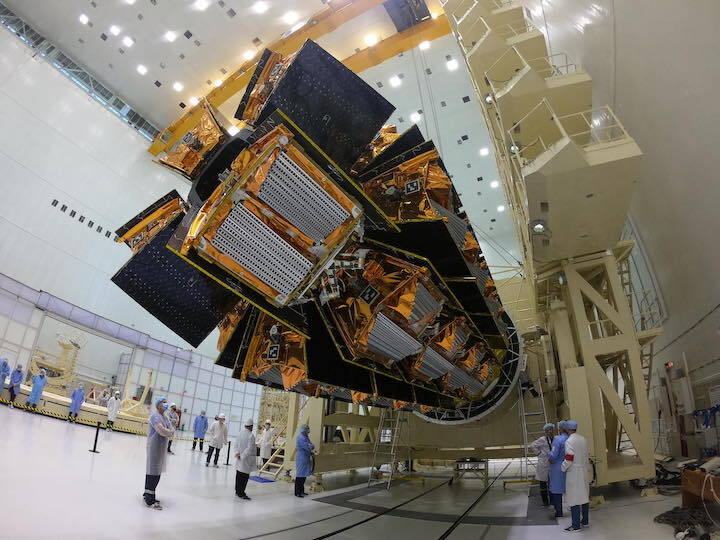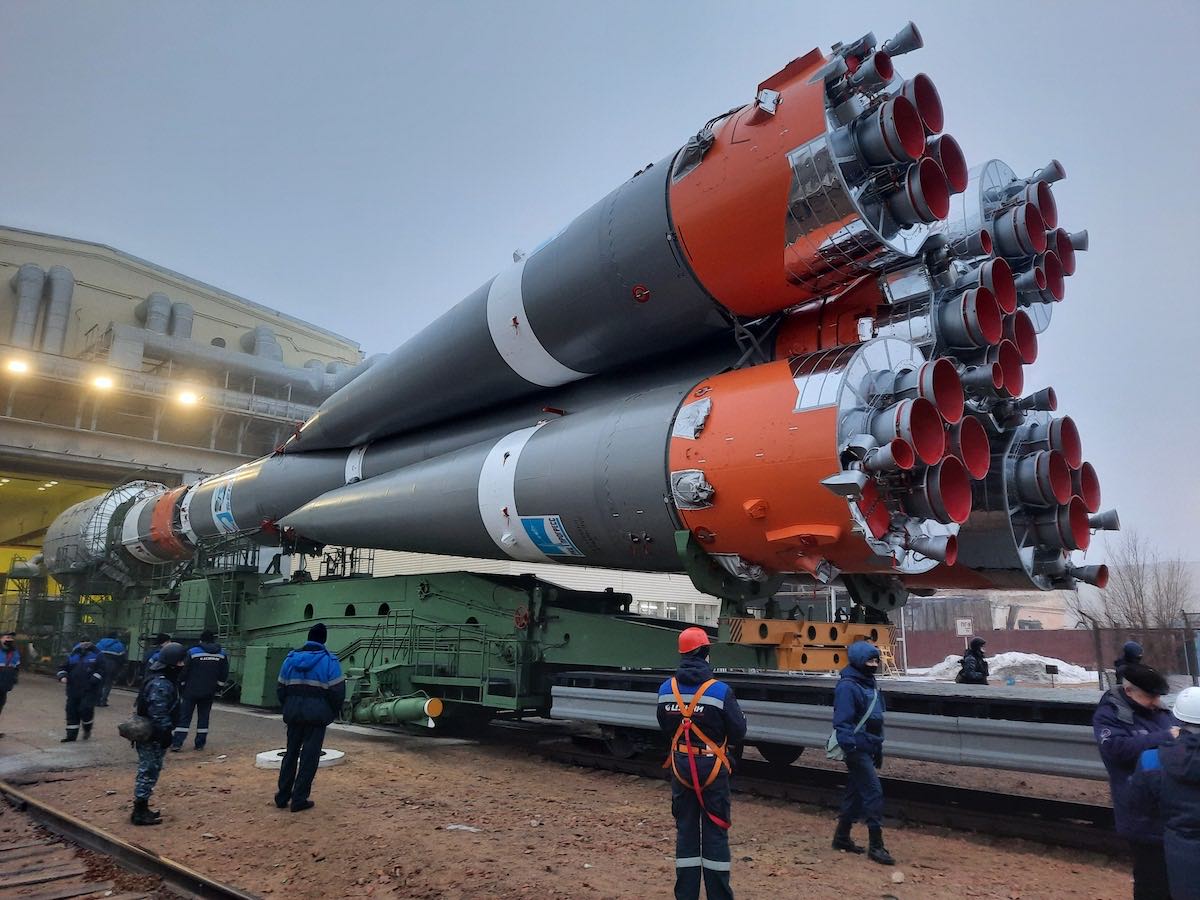15.03.2022

OneWeb working with Arianespace, who owes the satellite internet firm six more Soyuz launches, to find rides to orbit for more than 200 of its spacecraft left grounded by an embargo on Western payloads flying aboard Russian rockets.
But with launch capacity constrained outside of China and SpaceX, a major OneWeb competitor, the commercial satellite internet provider is facing an inevitable delay in completing its constellation, a milestone previously expected this summer.
Chris McLaughlin, OneWeb’s chief of government, regulatory, and engagement, said the company is working with Arianespace on finding a path to space for the rest of its first-generation satellites. OneWeb’s contract with Arianespace, originally signed in 2015, covers 19 Soyuz launches carrying 648 internet satellites into polar orbit.
Thirteen of those launches have been completed, all successfully, deploying 428 satellites for OneWeb’s broadband network. But that’s just two-thirds of the satellites OneWeb needs to go into full commercial service.
OneWeb aimed to launch 36 more satellites March 4 on a Soyuz rocket from the Baikonur Cosmodrome in Kazakhstan, but Russia’s space agency, led by Dmitry Rogozin, set conditions on the mission after rolling the rocket to its launch pad March 2.
In the aftermath of Russia’s invasion of Ukraine, and the subsequent Western sanctions, Rogozin demanded OneWeb promise services provided by the internet satellites would not be used for military purposes, and that the UK government give up its stake in OneWeb. The UK government declined, and OneWeb announced it is suspending launches from Baikonur, where all of the company’s remaining Soyuz missions were to launch.
McLaughlin told Spaceflight Now on Friday that OneWeb was not ready to provide any more public comments on the matter, but underscored the existing contract with Arianespace for six more launches, for which OneWeb has already paid.
“It’s natural for their first choice to be the provider that they already paid because they’re not trying to write off one-third of their contract,” said Caleb Henry, a senior analyst on the satellite industry at Quilty Analytics.
Arianespace oversees commercial launches using the heavy-lift Ariane 5, medium-class Soyuz, and light-class Vega rockets, and will manage the new Ariane 6 rocket program, designed to replace the Ariane 5. Just five more Ariane 5 launches remain on Arianespace’s schedule, before the legacy rocket is retired in favor of the Ariane 6. All five of the remaining Ariane 5 missions are fully booked by customers.
Henry said Arianespace could look to other rockets in its portfolio, like the Ariane 6, but there are no immediate openings. The first Ariane 6 test launch is scheduled at the end of this year.
“The catch is because Arianespace, like so many others, is in the process of transitioning to a new vehicle and OneWeb is caught in a lurch where there are no immediate options for a readily available heavy or medium-lift vehicle,” Henry said.
Arianespace has not responded to multiple requests for comment since Russian’s invasion of Ukraine began in late February.
OneWeb initially signed up as the customer for the inaugural launch of Europe’s new Ariane 6 rocket, but officials revised the contract and dropped the Ariane 6 launch agreement in 2020 after OneWeb filed for bankruptcy. ESA, which is funding Ariane 6’s development, now plans to launch on the first Ariane 6 mission a mass simulator and a cluster of small satellites for European universities and commercial startups.

After emerging from the bankruptcy process in late 2020, OneWeb was brought under the ownership of the UK government and Bharti Global, and Indian telecom company. Additional fundraising has added other major investors in OneWeb, including the Japanese company SoftBank, the French satellite communications firm Eutelsat, U.S.-based Hughes, and the South Korean business conglomerate Hanwha.
Henry said the shareholders each may have their own interests in where OneWeb turns to get its remaining satellites into orbit.
Bharti helped shepherd a tentative agreement between OneWeb and the commercial arm of the Indian Space Research Organization to investigate launching OneWeb satellites on India’s Polar Satellite Launch Vehicle and Geosynchronous Satellite Launch Vehicle Mk.3 rockets.
OneWeb and ISRO’s commercial arm, NewSpace India Ltd., signed a non-binding letter of intent on the matter last year. The PSLV is sized to haul lighter payloads than the Soyuz. The GSLV Mk.3 slightly exceeds the Soyuz lift capability.
But the GSLV Mk.3 has not established a regular cadence of launches, and has only flown three orbital missions to date.
Eutelsat, a French company, could try to steer OneWeb to remain loyal to Arianespace, Henry said. “I see Eutelsat as likely putting pressure on OneWeb to stick with Arianespace because that is what precedent would suggest.”
SoftBank might push for OneWeb to look at Japanese rockets. Japan’s H-2A rocket is nearing retirement and will soon be replaced by the H3 launch vehicle, another option in the medium to heavy lift range.
Chinese rockets aren’t a viable candidate for OneWeb due to export control restrictions, which have largely shut off Chinese launchers from Western business.
OneWeb could also look to U.S. rockets.
United Launch Alliance has sold all of its remaining Atlas 5 rockets, and the initial flights of its next-generation Vulcan rocket, which has not yet flown, are already booked with other customers. Other rockets on the commercial marketplace are either too small for OneWeb’s needs, or are still years from operational service.
The other possibility is for OneWeb to turn to SpaceX, which launches Falcon 9 rockets a few miles from OneWeb’s satellite factory at Kennedy Space Center in Florida.
But that’s not an attractive option for OneWeb because SpaceX is building its own commercial satellite internet network, called Starlink. Although OneWeb and Starlink are geared toward different segments of the telecom market, the networks are still rivals.
“I don’t think OneWeb will want to go with SpaceX because of Starlink,” Henry said. “I think that’s pretty straightforward, although SpaceX offer the only current high launch cadence Western heavy-lift vehicle with launch slots, so there’s the challenge there of do you dance with the devil on this one.”
SpaceX is likely the best bet for OneWeb if it wants to get the rest of its satellites up quickly, Henry said.
“I still think that SpaceX is the fastest route to completing OneWeb’s Gen 1 constellation but … they have their own pressing launch demands with customers,” he sad. “The difference for SpaceX is they have a backlog and storage of their flown boosters, so they don’t have to throttle up production to support OneWeb.”
Quelle: SN

